Police retreat as protesters force way into Hong Kong parliament
The main chamber was ransacked in scenes of unprecedented chaos during a three-hour occupation | WATCH
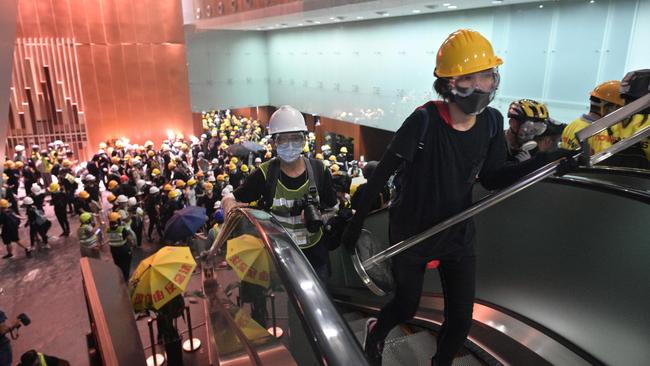
Hundreds of protesters swarmed into Hong Kong’s legislature last night, defacing portraits of lawmakers and spray-painting pro-democracy slogans in the chamber before vacating it as riot police cleared surrounding streets with tear gas and then moved inside.
The three-hour occupation, which ended early this morning, came on the 22nd anniversary of the former British colony’s return to China, a city holiday, and reflected mounting frustration with Hong Kong’s leader for not responding to protesters’ demands after several weeks of demonstrations. The protests were sparked by a government attempt to change extradition laws to allow suspects to be sent to China for trial.
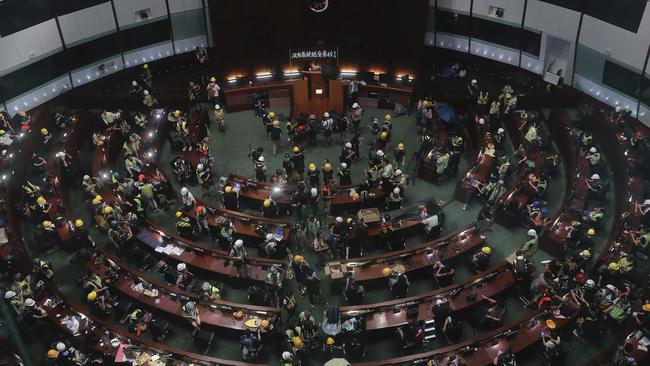
At a press conference in the early hours of this morning, Hong Kong leader Carrie Lam condemned the “extremely violent” storming of the legislature, which she described as “heartbreaking and shocking”.
Speaking beside Ms Lam, police chief Stephen Lo said: “Protesters’ violent acts have far exceeded the bottom line of peaceful expressions of demands.”
Protesters whacked away at thick glass windows until they shattered and then pried open steel security gates. Police initially retreated as the protesters entered, avoiding a confrontation and giving them the run of the building.
Demonstrators stoodon lawmakers’ desks and painted over the territory’s emblem on a wall. The crowd also wrote slogans calling for a democratic election of the city’s leader and denouncing the extradition legislation. Many wore yellow and white helmets, face masks and the black T-shirts that have become their uniform.
Police then announced that they would soon move in. A spokesman had earlier broadcast a warning that “appropriate force” would be used. Officers approached shortly after midnight and entered the legislative chambers after protesters had already left. There was no immediate word on any arrests or injuries.
The actions prompted organisers of a separate peaceful march against the extradition bill to change the end point of their protest from the legislature toa nearby park, after police asked them to call it off or change the route. Police wanted the march to end earlier in the WanChai district, but organisers said that would leave out many people who planned to join the march along the way.
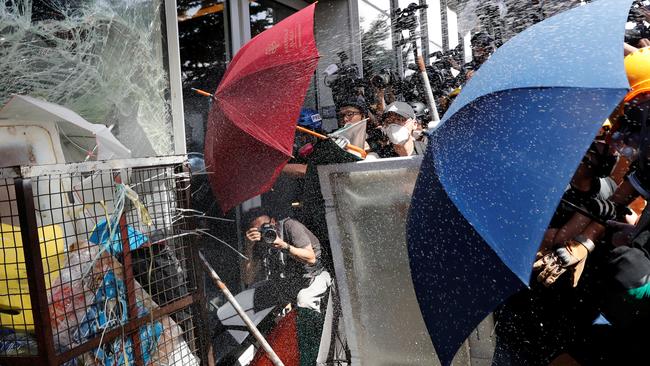
Police estimated 190,000 people joined the peaceful march, the third major one in as many weeks. Organisers estimated the number at 550,000.
The extradition proposal has heightened fears of eroding freedoms in the territory, which Britain returnedto China on July 1, 1997. Debate on the measure has been suspended indefinitely. Protesters want the bills formally withdrawn and Hong Kong’s embattled leader, Carrie Lam, to resign. Lam, who has come under withering criticism for trying to push the legislation through, pledged to be more responsive to public sentiment but has not responded directly to protesters’ demands.
In an address after a flag-raising ceremony marking the anniversary of the handover, Lam said the protests and two earlier marches that attracted hundreds of thousands of participants have taught her that she needs to listen better to youth andpeople in general.
“This has made me fully realise that I, as a politician, have to remind myself all the time of the need to grasp public sentimentsaccurately,” she told the gathering in the city’s cavernous convention centre.
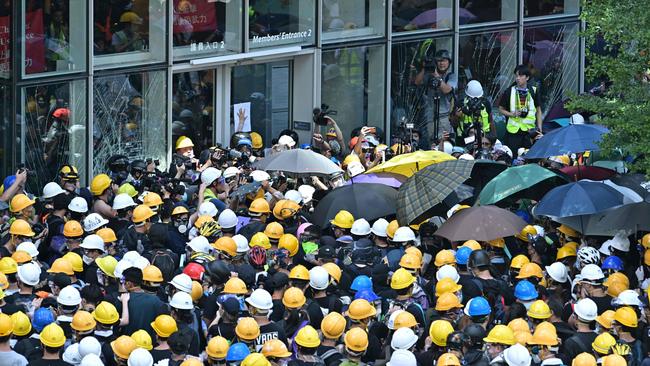
She insisted her government has good intentions, but said “I will learn the lesson and ensure that the government’s futurework will be closer and more responsive to the aspirations, sentiments and opinions of the community.” Security guards pushedpro-democracy lawmaker Helena Wong out of the room as she shouted at Lam to resign and withdraw the “evil” legislation. She later told reporters she was voicing the grievances and opinions of the protesters, who could not get into the event.
Mainland China’s entirely state-controlled media made no mention of Monday’s protests. The main evening news broadcast carried video of the flag-raising ceremony, along with parts of Lam’s address and shots of Hong Kong residents praising displays put on by the People’s Liberation Army garrison in the territory.
Chinese media outlets have barely reported on the protests since they began last month, other than to blame foreign forcesfor stirring up unrest. The extradition bill controversy has given fresh momentum to Hong Kong’s pro- democracy opposition movement, awakening broader concerns that China is chipping away at the rights guaranteed to Hong Kong for 50 years under a “one country, two systems” framework. The two marches in June drew more than a million people, accordingto organizer estimates.
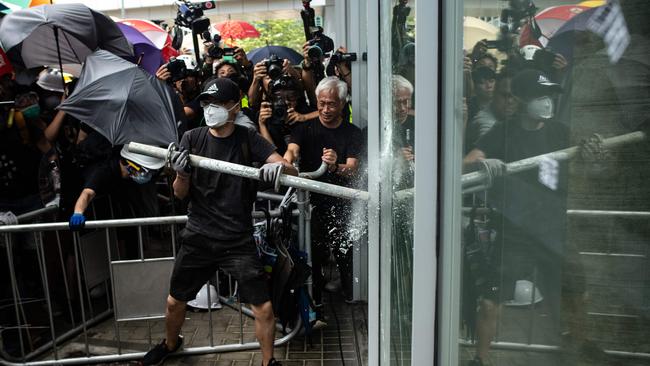
Jimmy Sham, a leader of the pro-democracy group that organised Monday’s march, told the crowd that Lam had not responded to their demands because she is not democratically elected. The leader of Hong Kong is chosen by a committee dominated by pro-China elites.
“We know that Carrie Lam can be so arrogant,” Sham said, rallying the crowd under a blazing sun before the start of the marchat Victoria Park. “She is protected by our flawed system.”
The protesters are also demanding an independent inquiry into policeactions during a June 12 protest, when officers used tear gas and rubber bullets to disperse a demonstration that blockedthe legislature on the day that debate on the bill had been scheduled to resume.
The police say the use of force was justified, but since then have largely adopted softer tactics, even as protesters besiegedpolice headquarters in recent days, pelting it with eggs and spray-painting slogans on its outer walls. The area around GoldenBauhinia Square, where the flag-raising ceremony took place, was blocked off from Saturday to prevent protesters from gathering to disrupt it. Before the morning ceremony, protesters trying to force their way to the square were driven back by officers with plastic shields and batons, the retreating protesters pointing open umbrellas to ward off pepper spray.
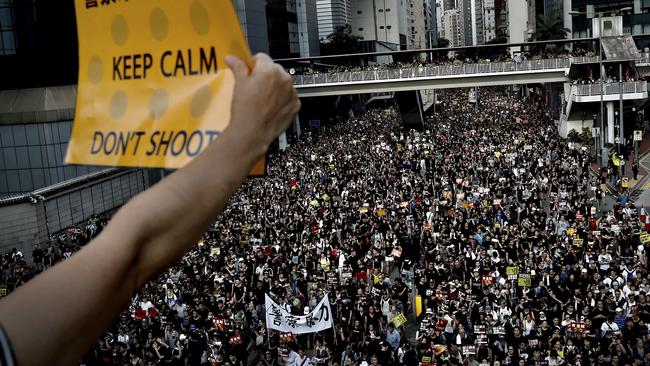
The extradition legislation has also drawn opposition from the legal profession, commercial groups and foreign nations, reflecting Hong Kong’s status as an international business centre with a strong independent judiciary and high degree of transparency.
During a brief visit to Mongolia on Monday, US National Security Adviser John Bolton said Washington expects “China like every other country to adhere to its international obligations” regarding Hong Kong.
China rejects all such statements as foreign interference. In Beijing, Chinese foreign ministry spokesman Geng Shuang told reporters at a daily briefing that “Hong Kong affairs are purely China’s internal affairs, and no foreign country has the right to intervene.”
AFP, AP


